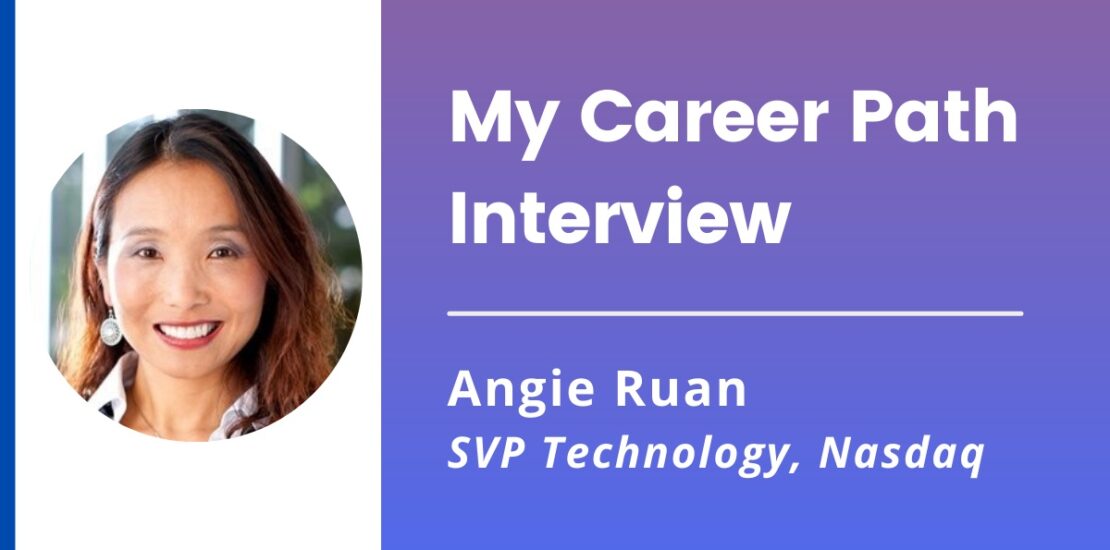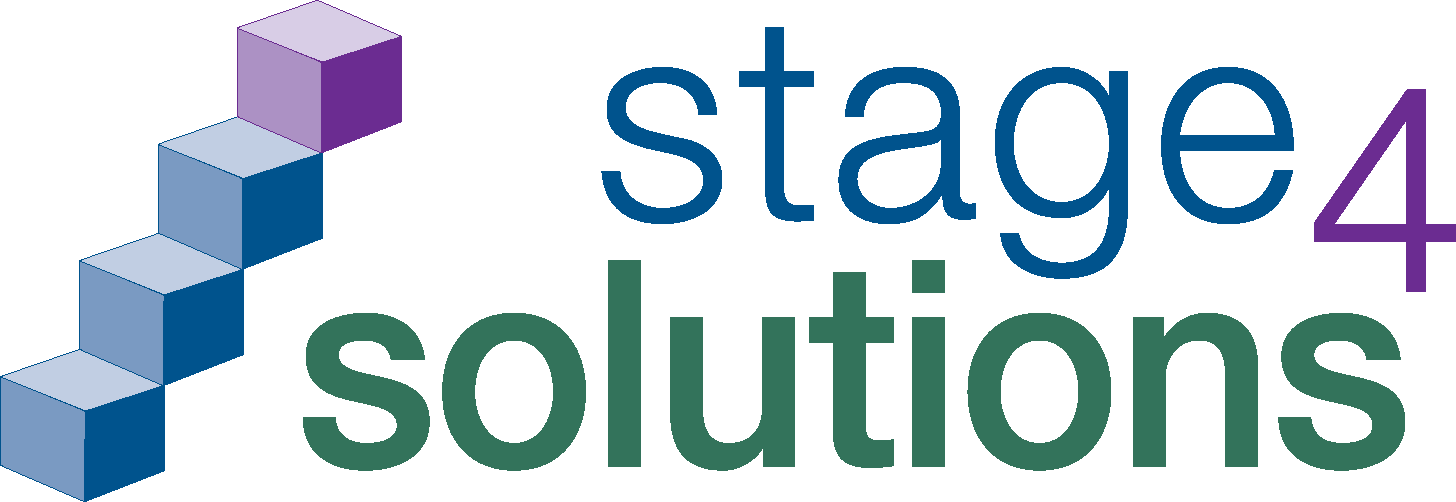My Career Path: Interview with Angie Ruan, SVP Technology, Nasdaq
- June 29, 2021
- Posted by: Selen Warner
- Category: Blog

This month, we had the pleasure to speak with Angie Ruan, SVP Technology, Nasdaq, about her career path and the decisions she made to achieve her success. Here at Stage 4 Solutions, we support professionals’ career growth and one way to enable success is to learn from others. And, we have much to learn from Angie, who is an Asian American female technology leader with both startup and Fortune 50 experience. Angie has a passion for connecting business, technology, and people together. She is a multiplier who can maximize people to their best potential, she does not settle for the status quo. Giving back to help others thrive inspires her every day.
Feel free to reach out to Angie with your questions and thoughts: connect with Angie on LinkedIn
Can you tell us more about your current role as SVP Technology at Nasdaq?
Many people think of Nasdaq as only a stock exchange, but we have four business areas; Corporate Platforms, Market Services, Investment Intelligence, and Market Technology. Through Market Technology, more than 2,300 companies in 50 countries that span the world’s financial industry, including capital markets infrastructure operators, market participants, banks and regulators use Nasdaq technology. As the SVP Technology, I am responsible for the technology that power Corporate Platform and Market Technology. It is an amazing role, working with great people and partnering with businesses to continue transforming.
What was your path to Nasdaq?
After obtaining a Master’s Degree in Computer Science from the University of California, Santa Barbara, I started my career working as a software engineer at tech startups. Over the years, I held several technology leadership roles at eBay, PayPal and American Express, leading large teams. In 2018, I joined Nasdaq.
What were your career aspirations when you were in college?
I don’t think I really had career aspirations when I was in college. The university I went to, Tsinghua University, was the hardest to get into in China. So, it was hard work! I just wanted to make it through and graduate. My major was in Computer Science, not because I knew much about computer science at the time, but I was very good at math and that’s one reason I chose it. One other funny reason is my mother’s advice. Both of my parents are chemical engineers and at their laboratory, the computer rooms were air-conditioned, so my mom told me to choose computer science so I would work in a cool, air-conditioned room! Moms truly know best! 😊
How did you begin your career?
I wanted to come to America as I felt there would be more freedom to make my own career, so I joined the Master’s Degree program in Computer Science at the University of California. I was working at part-time jobs, studying at the computer lab at night, making a good living. Later, I started a full-time job in Santa Barbara as an engineer, enjoying the beautiful beaches and overall feeling comfortable with where I was until one of my friends told me about the startups in Silicon Valley. That was an eye-opener for me because I had not considered working for startups. So, I transitioned to a promising startup located in Silicon Valley. Silicon Valley can offer so much and it definitely broadened things for me.
As you progressed through your career, how did you assess new opportunities?
I would never have thought I would be doing what I am doing right now. Careers are journeys and they progress due to many factors. There are ups and downs in all careers. Every part of my career journey is also a bit different. One of the things I can say made an impact for me is taking risks to try something different. Even today, I ask myself, “Am I maximizing my capacity?” If I feel like I am not maximizing my capacity, I know that I need to do something different. I have been with Nasdaq for 3 years now and I quite often challenge myself to do better for my company, the industry and for myself.
Where do you think that the motivation comes from to be bold and take risks?
I was not born with those traits. I found a few things that really helped me and one of them is mentorship. I thought I was not visible enough to receive thriving opportunities and that I needed to fight for promotions as a non-white, Asian woman in tech. During my time at eBay, I evaluated the leaders in the company and I really admired how the CIO communicated. Although I had no relationship with the CIO, I reached out to him, explaining that I would appreciate a few minutes of his time to share my career goals and get advice. He became my mentor! I understood that people would actually help you and you just needed to ask. This relationship helped me tremendously. When I was working at PayPal, a recruiter from American Express reached out to me, offering a Unit CIO role because my mentor had recommended me. I was comfortable at PayPal and changing my job and moving from Silicon Valley to NYC with my family was a risk, but we took it, together.
What surprised you the most in your career as a Technology Executive?
So many people would think that being a technology executive is all about technology, but many leadership traits get involved when you get to the executive level. You need to be good at building relationships, communication, inspiring teams, building strategy and always thinking ahead. There are so many aspects you need to learn! Everything is changing so fast in technology too and you also need to keep up with this change.
What is one of the biggest challenges you have faced in your career and how did you overcome it?
I have trouble answering just “one” challenge! There have always been challenges in different phases of my career. Getting ahead and being visible was a challenge at first. For example, when I moved to NYC for my role at American Express, I experienced a huge culture shock – from the west coast to the east coast. Also, I continuously work toward improving my communication skills.
How do you balance your professional and personal goals?
I don’t know if I am good enough when it comes to balancing, but I try. I prioritize my goals in this order: my own health, my family and my career. Sometimes it isn’t easy to stick with this order, and the priorities shift. When I am mentally and physically healthy, I am able to make my family happy and be better at my job. Physical exercise is my meditation and motivation. I have been a dancer for 17 years. It all started when I took my daughter to a dance class, and I loved it so much I started a dance club with my friends. During Covid, I wasn’t able to dance and instead, I started running every day.
What advice would you give to your younger self?
First of all, be patient. Life is a journey and there will be ups and downs. When there is a setback, focus on how you would get up. Another piece of advice is to take risks and be comfortable with being uncomfortable. Challenge yourself. Ask yourself if you are too comfortable with what you are doing? If yes, maybe it’s time to take risks. Ask for help. You are not alone, but you have to ask for help in order to receive it. I received great mentorship, and now I give back to the community and mentor others.
What advice do you have for empowering teams?
Aim high and think big. This is one thing I always tell myself and other leaders.
What advice would you give to women in technical roles?
Many women eventually drop out of technical competencies and become program managers, which is great because it is a much-needed skill. However, my advice is to continue learning the tech even if they choose to become program managers. Realize and focus on your strengths vs. your weaknesses. For example, if your strength is relationship building, maximize on it. I come from a culture where women are supposed to remain modest. I advise against it. Don’t sell yourself too short and know your value, and people will recognize your value. Raise your hand and be the purple cow!
Feel free to reach out to Angie with your questions and thoughts: connect with Angie on LinkedIn

